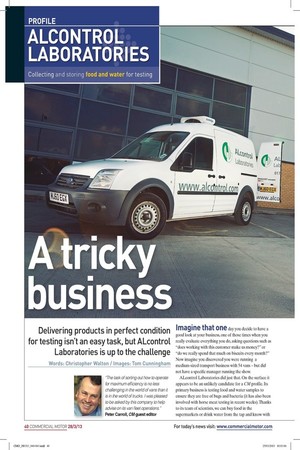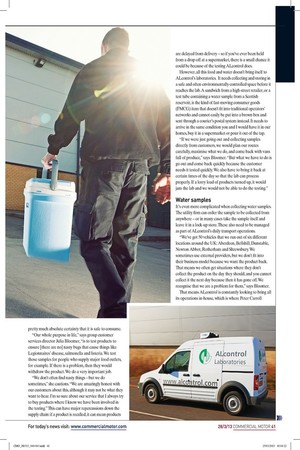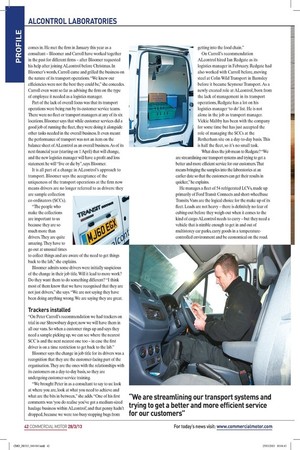A trick business Delivering products in perfect condition Imagine that
Page 26

Page 27

Page 28

Page 29

If you've noticed an error in this article please click here to report it so we can fix it.
one day you decide to have a for testing isn't an easy task, but ALcontrol really evaluate everything you do, asking questions such as Laboratories is up to the challenge "do we really spend that much on biscuits every month?"
Words: Christopher Walton / Images: Tom Cunningham medium-sized transport business with 54 vans — but did good look at your business, one of those times when you "does working with this customer make us money?" or Now imagine you discovered you were running a not have a specific manager running the show.
"The task of sorting out how to operate ALcontrol Laboratories did just that. On the surface it for maximum efficiency is no less appears to be an unlikely candidate for a CM profile. Its challenging in the world of vans than it primary business is testing food and water samples to is in the world of trucks. I was pleased ensure they are free of bugs and bacteria (it has also been to be asked by this company to help involved with horse meat testing in recent weeks). Thanks advise on its van fleet operations." to its team of scientists, we can buy food in the Peter Carroll, CM guest editor supermarkets or drink water from the tap and know with pretty much absolute certainty that it is safe to consume.
"Our whole purpose in life," says group customer services director Julia Bloomer, "is to test products to ensure [there are no] nasty bugs that cause things like Legionnaires' disease, salmonella and listeria. We test those samples for people who supply major food outlets, for example. If there is a problem, then they would withdraw the product. We do a very important job.
"We don't often find nasty things — but we do sometimes," she cautions. "We are amazingly honest with our customers about this, although it may not be what they want to hear. I'm so sure about our service that I always try to buy products where I know we have been involved in the testing." This can have major repercussions down the supply chain: if a product is recalled, it can mean products are delayed from delivery — so if you've ever been held from a drop-off at a supermarket, there is a small chance it could be because of the testing ALcontrol does.
However, all this food and water doesn't bring itself to ALcontrol's laboratories. It needs collecting and storing in a safe and often environmentally-controlled space before it reaches the lab. A sandwich from a high-street retailer, or a test tube containing a water sample from a Scottish reservoir, is the kind of fast-moving consumer goods (FMCG) item that doesn't fit into traditional operators' networks and cannot easily be put into a brown box and sent through a courier's postal system instead. It needs to arrive in the same condition you and I would have it in our homes, buy it in a supermarket or pour it out of the tap.
"If we were just going out and collecting samples directly from customers, we would plan our routes carefully, maximise what we do, and come back with vans full of produce," says Bloomer. "But what we have to do is go out and come back quickly because the customer needs it tested quickly. We also have to bring it back at certain times of the day so that the lab can process properly. If a lorry load of products turned up, it would jam the lab and we would not be able to do the testing."
Water samples It's even more complicated when collecting water samples. The utility firm can order the sample to be collected from anywhere — or in many cases take the sample itself and leave it in a lock-up store. These also need to be managed as part of ALcontrol's daily transport operations.
"We've got 50 vehicles that we run out of six different locations around the UK: Aberdeen, Bellshill, Dunstable, Newton Abbot, Rotherham and Shrewsbury. We sometimes use external providers, but we don't fit into their business model because we want the product back. That means we often get situations where they don't collect the product on the day they should, and you cannot collect it the next day because then it has gone off. We recognise that we are a problem for them," says Bloomer.
That means ALcontrol is constantly looking to bring all its operations in-house, which is where Peter Carroll comes in. He met the firm in January this year as a consultant — Bloomer and Carroll have worked together in the past for different firms — after Bloomer requested his help after joining ALcontrol before Christmas. In Bloomer's words, Carroll came and grilled the business on the nature of its transport operations. "We knew our efficiencies were not the best they could be," she concedes. Carroll even went so far as advising the firm on the type of employee it needed as a logistics manager.
Part of the lack of overall focus was that its transport operations were being run by its customer service teams. There were no fleet or transport managers at any of its six locations. Bloomer says that while customer services did a good job of running the fleet, they were doing it alongside other tasks needed in the overall business. It even meant the performance of transport was not an item on the balance sheet of ALcontrol as an overall business. As of its next financial year (starting on 1 April) that will change, and the new logistics manager will have a profit and loss statement he will "live or die by", says Bloomer.
It is all part of a change in ALcontrol's approach to transport. Bloomer says the acceptance of the uniqueness of the transport operations at the firm now means drivers are no longer referred to as drivers: they are sample collection co-ordinators (SCCs).
"The people who make the collections are important to us because they are so much more than drivers. They are quite amazing. They have to go out at unusual times to collect things and are aware of the need to get things back to the lab," she explains.
Bloomer admits some drivers were initially suspicious of the change in their job title. Will it lead to more work? Do they want them to do something different? "I think most of them know that we have recognised that they are not just drivers," she says. "We are not saying they have been doing anything wrong. We are saying they are great.
Trackers installed "On Peter Carroll's recommendation we had trackers on trial in our Shrewsbury depot; now we will have them in all our vans. So when a customer rings up and says they need a sample picking up, we can see where the nearest SCC is and the next nearest one too — in case the first driver is on a time restriction to get back to the lab."
Bloomer says the change in job title for its drivers was a recognition that they are the customer-facing part of the organisation. They are the ones with the relationships with its customers on a day-to-day basis, so they are undergoing customer-service training.
"We brought Peter in as a consultant to say to us: look at where you are, look at what you need to achieve and what are the bits in between," she adds. "One of his first comments was 'you do realise you've got a medium-sized haulage business within ALcontrol', and that penny hadn't dropped, because we were too busy stopping bugs from getting into the food chain."
On Carroll's recommendation ALcontrol hired Ian Redgate as its logistics manager in February. Redgate had also worked with Carroll before, moving steel at Colin Wild Transport in Barnsley before it became Seymour Transport. As a newly created role at ALcontrol, born from the lack of management in its transport operations, Redgate has a lot on his logistics manager 'to do' list. He is not alone in the job as transport manager. Vickie Maltby has been with the company for some time but has just accepted the role of managing the SCCs at the Rotherham site on a day-to-day basis. This is half the fleet, so it's no small task.
What does the job mean to Redgate? "We are streamlining our transport systems and trying to get a better and more efficient service for our customers. That means bringing the samples into the laboratories at an earlier date so that the customers can get their results in quicker," he explains.
He manages a fleet of 54 refrigerated LCVs, made up primarily of Ford Transit Connects and short-wheelbase Transits. Vans are the logical choice for the make up of its fleet. Loads are not heavy — there is definitely no fear of cubing-out before they weigh-out when it comes to the kind of cargo ALcontrol needs to carry — but they need a vehicle that is nimble enough to get in and out of multistorey car parks, carry goods in a temperaturecontrolled environment and be economical on the road.
Redgate's task in the coming weeks will be to evaluate the fleet and see which marque will provide the company with the best value. The fleet is all leased from three different partners, but even that arrangement is up for review as part of taking total control of its in-house transport operations. He admits the company has been buying the same models over the years because it has not had the expertise in-house to evaluate vehicle performance. "It's just been people doing the best they can, replacing vans with the vans they had before," says Bloomer of the task Redgate has in front of him Transport management The transport management of the fleet isn't simple either. It isn't just a case of planning a route, sending someone out for the day and waiting for them to come back. The SCCs have to go in and out of labs all day because of the time sensitivities attached to the samples. "We have got to feed the labs," says Redgate.
This also affects how the fleet is staffed. Drivers work set shifts, but there is a standby pool of `zero-hour' drivers who have not got time on the road under their belts and are ready to go out within 24 hours' notice. It also means keeping spare vans on site for use by zero-hour drivers when times get tight. This is the type of operation ALcontrol needs, and something an external supplier cannot provide. Redgate says it isn't the kind of model he has ever seen in any transport operation he has worked for.
"Before joining ALcontrol I was interim transport manager at Yusen (NYK) Logistics, where I was working on the Netto contract in South Elmsall. It was time-sensitive, with store delivery times to meet. I mainly worked on the LGV side; I have done some light commercial stuff before, but coming in here, and trying to get your head around what they are doing here you can apply the same principles just using different mannerisms. Then it is all about what mannerisms work," he explains.
"Like a challenge — and trust me, this is a challenge.The only way to get your head around this is to understand the systems. You need to get them in place. The customer service team were not transport people. It has been quite refreshing for them having me come in with a pair of transport eyes. Hopefully, we can move in the right direction."
Bloomer and Redgate admit the project to turn around the transport operations at ALcontrol is still a work in progress. "We want to shine," says Bloomer. "We want to be a superb service business known throughout the UK and not just in our own industry." • ALcontrol Laboratones









































